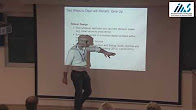 1:29:34 Ben Brooks - Information design and robust predictions Ben Brooks (University of Chicago) - Information design and robust predictions
1:29:34 Ben Brooks - Information design and robust predictions Ben Brooks (University of Chicago) - Information design and robust predictions  1:28:02 Emir Kamenica - Persuasion vs. incentives Emir Kamenica (University of Chicago) - Persuasion vs. incentives
1:28:02 Emir Kamenica - Persuasion vs. incentives Emir Kamenica (University of Chicago) - Persuasion vs. incentives  1:23:33 Sylvain Chassang - Data-Driven Policy Design Sylvain Chassang (New York University) - Data-Driven Policy Design
1:23:33 Sylvain Chassang - Data-Driven Policy Design Sylvain Chassang (New York University) - Data-Driven Policy Design  22:38 Opening words: Gur Yaari Opening words: Gur Yaari (Faculty of Engineering, Bar Ilan University)
22:38 Opening words: Gur Yaari Opening words: Gur Yaari (Faculty of Engineering, Bar Ilan University)  1:22:36 Balazs Szentes - Dynamic Contracts with Evolving Types, Part II Balazs Szentes (London School of Economics) - Dynamic Contracts with Evolving Types, Part II
1:22:36 Balazs Szentes - Dynamic Contracts with Evolving Types, Part II Balazs Szentes (London School of Economics) - Dynamic Contracts with Evolving Types, Part II  1:26:45 Elchanan Ben-Porath - Mechanisms with Evidence: Robustness and Commitment Elchanan Ben-Porath (The Hebrew University of Jerusalem) - Mechanisms with Evidence: Robustness and Commitment
1:26:45 Elchanan Ben-Porath - Mechanisms with Evidence: Robustness and Commitment Elchanan Ben-Porath (The Hebrew University of Jerusalem) - Mechanisms with Evidence: Robustness and Commitment  1:24:34 Balazs Szentes - Dynamic Contracts with Evolving Types, Part I Balazs Szentes (London School of Economics) - Dynamic Contracts with Evolving Types, Part I
1:24:34 Balazs Szentes - Dynamic Contracts with Evolving Types, Part I Balazs Szentes (London School of Economics) - Dynamic Contracts with Evolving Types, Part I  1:23:07 Sylvain Chassang - Robust Dynamic Contracting Sylvain Chassang (New York University) - Robust Dynamic Contracting
1:23:07 Sylvain Chassang - Robust Dynamic Contracting Sylvain Chassang (New York University) - Robust Dynamic Contracting  1:30:37 Eddie Dekel - Evidence in Games and Mechanism Design Eddie Dekel (Tel Aviv University) - Evidence in Games and Mechanism Design
1:30:37 Eddie Dekel - Evidence in Games and Mechanism Design Eddie Dekel (Tel Aviv University) - Evidence in Games and Mechanism Design  1:31:13 Ariel Rubinstein - A Model of Persuasion with a Boundedly Rational Agent Ariel Rubinstein (Tel Aviv University) - A Model of Persuasion with a Boundedly Rational Agent
1:31:13 Ariel Rubinstein - A Model of Persuasion with a Boundedly Rational Agent Ariel Rubinstein (Tel Aviv University) - A Model of Persuasion with a Boundedly Rational Agent  2:01:07 Eric Maskin - Introduction to Mechanism Design: Quasi-linear Preferences Eric Maskin (Harvard University) - Introduction to Mechanism Design: Quasi-linear Preferences
2:01:07 Eric Maskin - Introduction to Mechanism Design: Quasi-linear Preferences Eric Maskin (Harvard University) - Introduction to Mechanism Design: Quasi-linear Preferences  1:55:34 Eric Maskin - Introduction to Mechanism Design: General Preferences Eric Maskin (Harvard University) - Introduction to Mechanism Design: General Preferences
1:55:34 Eric Maskin - Introduction to Mechanism Design: General Preferences Eric Maskin (Harvard University) - Introduction to Mechanism Design: General Preferences  1:18:18 Session 16: Chair - Kim Jacobson Effects of Immune History on Immune Responses to Influenza Vaccines
1:18:18 Session 16: Chair - Kim Jacobson Effects of Immune History on Immune Responses to Influenza Vaccines Tomer Hertz, Ben-Gurion University of the Negev
Relationships and Transitions Between B and
Plasma cell Populations in S...
 1:42:35 Session 15: Chair - Tomer Hertz Inferring the Dynamics and Topology of Immune Cell
1:42:35 Session 15: Chair - Tomer Hertz Inferring the Dynamics and Topology of Immune Cell Differentiation Pathways
Thomas Höfer, German Cancer Research Center
The Role of Histone-moifying Complexes in Regulating B cell Programs to ...
 1:45:11 Session 14: Chair - Ron Gartenhaus Structural Diversity Narrowing Leads to Repertoire overlap in Population
1:45:11 Session 14: Chair - Ron Gartenhaus Structural Diversity Narrowing Leads to Repertoire overlap in PopulationYoram Louzoun, Bar Ilan University
GARDing the secretory pathway via Golgi quality control
Yifat Merbl, Weizmann Institute ...
 1:05:50 Keynote Speaker: Hybrid Multiscale Models for Simulating Functional Motion in Macromole.. Michael Levitt, Stanford University
1:05:50 Keynote Speaker: Hybrid Multiscale Models for Simulating Functional Motion in Macromole.. Michael Levitt, Stanford University  1:27:43 Tutorial: Multiscale modeling in multicellular systems Kenneth Buetow, Arizona State University
1:27:43 Tutorial: Multiscale modeling in multicellular systems Kenneth Buetow, Arizona State University  1:30:05 Session 13: Chair - Shai Shen-or TCR Repertoire Features That Define Specificity in Pathogens and
1:30:05 Session 13: Chair - Shai Shen-or TCR Repertoire Features That Define Specificity in Pathogens andTumors
Paul G. Thomas, St. Jude Children’s Research Hospital
Immune Stimulation of Hematopoietic Stem Cells
Roi Gazit, Ben-Gurion ...
 1:40:10 Session 12: Chair - Yoram Louzoun How T cell cross-reactivity helps the immune system learn self-nonself discrimination
1:40:10 Session 12: Chair - Yoram Louzoun How T cell cross-reactivity helps the immune system learn self-nonself discriminationJohannes Textor, Radboud University Medical Centre
MNKs Switch the Cellular Translatome by Regulating eIF4E1-e...
 1:52:14 Session 11: Chair - Michal Or-Guil Navigating the Diversity of Regulatory T cell TCR Repertoire
1:52:14 Session 11: Chair - Michal Or-Guil Navigating the Diversity of Regulatory T cell TCR RepertoireDavid Klatzmann, Pierre and Marie Curie University
Clonal Evolution of Human Memory B cell Responses
Hedda Wardemann, German Cancer Res...
 1:28:45 Eighth Session: Women's Words Identity and Voice Chair: Oded Zinger
1:28:45 Eighth Session: Women's Words Identity and Voice Chair: Oded ZingerAnabella Esperanza, Multiple Sources of a Woman's Essay -
Cultural Capital in Transition (Istanbul, 1871)
Elisa Martin Ortega, Identity and Writing: The Case of Eastern Sephard...
 1:31:43 Seventh Session: Representations of Women Chair: Paola Tartakoff
1:31:43 Seventh Session: Representations of Women Chair: Paola TartakoffRuth Lamdan, Jewish Women as Reflected in Eulogies and Sermons of Ottoman Sages in the 16th–17th Centuries
Susan Nashman Fraiman, “La belle Juive et la belle a rabe” —
Depi...
 1:31:34 Sixth session: Women and the Establishment: From the Ottoman Empire to Morocco and the Yishuv Chair: Efrat Aviv
1:31:34 Sixth session: Women and the Establishment: From the Ottoman Empire to Morocco and the Yishuv Chair: Efrat AvivOra (Rodrigue) Schwarzwald, The Status of 16th Century Jewish Women in the Ottoman Empire According to Seder Nashim and
Shulḥan Hapanim in Ladino
Michal Ben-Ya’akov, Using Cul...
 1:31:29 Fifth session: Education and Identity: Libya, Tunisia , Turkey Chair: Claudia Rosenzweig
1:31:29 Fifth session: Education and Identity: Libya, Tunisia , Turkey Chair: Claudia RosenzweigRachel Simon, Libyan Jewish Women’s Lore: From Home Schooling to Formal Education
Joy A. Land, Creating Cultural Capital: The Education of Jewish Females at the Alliance I...
 1:38:25 Session 10: Chair - Bartlomiej Swiatczak The Abrahamic Nature of Shark Antigen Receptors
1:38:25 Session 10: Chair - Bartlomiej Swiatczak The Abrahamic Nature of Shark Antigen ReceptorsMartin Flajnik, University of Maryland School of Medicine
Three time scales in the coevolution of influenza and human immunity
Sarah Cob...
 1:30:18 Session 9 Chair Gur Yaari Ecological Regulation of Immune Self-Tolerance
1:30:18 Session 9 Chair Gur Yaari Ecological Regulation of Immune Self-ToleranceUri Nevo, Sackler School of Medicine
Exploiting functional B cellrepertoire covergence to determine vaccination elicited B cell receptor sequences i...
 1:47:28 Session 8: Chair - Uri Hershberg B cell Selection in Development, What Does Repertoire Tell Us?
1:47:28 Session 8: Chair - Uri Hershberg B cell Selection in Development, What Does Repertoire Tell Us? Deborah Dunn-Walters, University of Surrey
Exploring Antibody Recognition Using High Throughput Binding Data
Michal Or-Gui...
 1:29:52 Tutorial: Inferring cellular dynamics from labeling data Rob de Boer, Utrecht University
1:29:52 Tutorial: Inferring cellular dynamics from labeling data Rob de Boer, Utrecht University  1:32:42 Session 7: Chair - Yanay Ofran Maximum-entropy Description of Repertoire Sequencing Data
1:32:42 Session 7: Chair - Yanay Ofran Maximum-entropy Description of Repertoire Sequencing Data Andrea Pagnani, Politecnico di Torino
Generation, Selection and Maturation of Healthy Immune Repertoires
Thierry Mora, Ecole normale sup...
 1:30:43 Session 6: Chair - Andrew Collins All Models Are Wrong, Some Are Useful:
1:30:43 Session 6: Chair - Andrew Collins All Models Are Wrong, Some Are Useful:Designing Antibodies Based on Inaccurate Models
Yanay Ofran, Bar Ilan University
Inferring Population Frequency and Dynamics of T-cells Specific to Common an...
 1:48:46 Tutorial: Repertoire Analysis Repertoire Analysis
1:48:46 Tutorial: Repertoire Analysis Repertoire AnalysisJason Vander Heiden, Yale School of Medicine
 1:47:40 Session 5: Chair - Uri Hershberg Quantifying the balance of predtermination and stochasticity in the diversity of immune repertoires
1:47:40 Session 5: Chair - Uri Hershberg Quantifying the balance of predtermination and stochasticity in the diversity of immune repertoiresVictor Greiff, ETH
Individualized Immunoglobulin Germline Database Production in Multiple Specie...
 1:40:29 Session 4: Chair - Gur Yaari IMGT®: Immunoinformatics Bridges for The Adaptive Immune Responses
1:40:29 Session 4: Chair - Gur Yaari IMGT®: Immunoinformatics Bridges for The Adaptive Immune ResponsesMarie-Paule Lefranc, Montpellier University and CNRS
Repertoire Development: It May Be Stochastic, But Nothing Is Left to Chance!...
 1:27:54 Session 3: Chair - Sol Efroni Predicting Who Does and Who Does Not Become Infected with HIV
1:27:54 Session 3: Chair - Sol Efroni Predicting Who Does and Who Does Not Become Infected with HIVDaniel Douek, National Institutes of Health
Creating Value from Antibody/B-cell and T-cell Repertoire Data: the AIRR Community Initiat...
 1:02:42 Keynote Speaker: A Stochastic Caclus for T and B Lymphocyte Phil Hodgkin, Walter and Eliza Hall Institute of Medical
1:02:42 Keynote Speaker: A Stochastic Caclus for T and B Lymphocyte Phil Hodgkin, Walter and Eliza Hall Institute of Medical Health
 59:12 Session 2: Chair - Nir Friedman Analysis of B Cell Antibody Reptoires from Next-Generation Sequencing in Multiple Sclerosis Other Diseases
59:12 Session 2: Chair - Nir Friedman Analysis of B Cell Antibody Reptoires from Next-Generation Sequencing in Multiple Sclerosis Other Diseases Steven H. Kleinstein, Yale School of Medicine
Updating Ideas About the Evolution of Lif...
 1:21:02 Session 1: Chair - Steven Kleinstein Signaling and Selection in the Germinal Center
1:21:02 Session 1: Chair - Steven Kleinstein Signaling and Selection in the Germinal CenterMark Shlomchik, University of Pittsburgh School of Medicine
B cell Repertoire Responses in Vaccination and Infection
Scott D Boyd, Stanford University
 1:16:00 Fourth Session: Women’s Piety Between East and West Chair: Moshe Rosman
1:16:00 Fourth Session: Women’s Piety Between East and West Chair: Moshe RosmanEve Krakowski and Elisheva Baumgarten: A Dialogue
 1:28:41 Third Session: Medieval Gender Boundaries Chair: Shira Wolosky
1:28:41 Third Session: Medieval Gender Boundaries Chair: Shira WoloskySharon Koren, The Redemption of Leah in the Zohar
Rebecca Winer, Breastmilk and Community: Gender Boundaries and Wet Nursing Practices
among Muslims in al-Andalus and Jews, Chr...
 1:33:23 Second Session: Some Geniza Women Slaves and Converts Chair: Renée Levine Melammed
1:33:23 Second Session: Some Geniza Women Slaves and Converts Chair: Renée Levine MelammedMoshe Yagur, Manumitted Female Slaves and Their (Lack of) Cultural Capital
Craig Perry, Jewish Women and Their Slaves in the Cairo Geniza Documents
Uriel Simonsohn, Jew...
 1:40:35 First Session: Cultural Capital in Geniza Sources Greetings
1:40:35 First Session: Cultural Capital in Geniza Sources GreetingsMoshe Rosman, Research Group Leader: Jewish Women’s Cultural Capital
First Session, Cultural Capital in Geniza Sources
Chair: Ruth Karras






